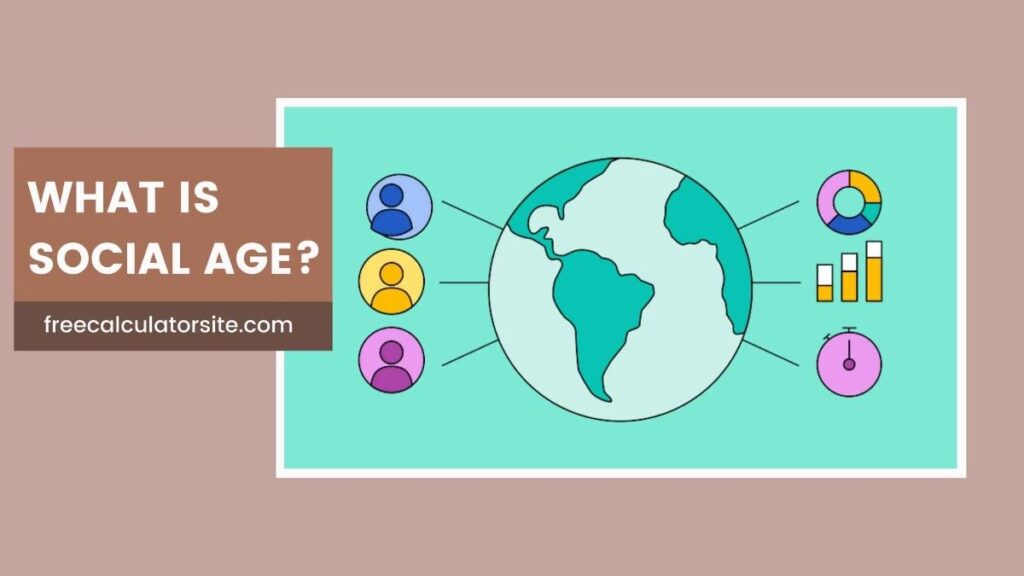Last updated on October 10th, 2024 at 07:27 pm

In today’s diverse world, understanding the concept of age has gone far beyond the simple counting of years.
Age is not merely a number that defines how long we’ve lived; it also reflects how we engage with society, adapt to cultural norms, and evolve within different life stages.
Among the various ways to define age, Social Age is an intriguing concept that highlights how individuals interact with the social expectations and roles assigned to them by society.
But what exactly is social age, and how does it differ from chronological age or other age-related measures?
Let’s dive deeper into this unique aspect of human development.
Defining Social Age
Social age refers to the societal expectations, norms, and roles associated with different stages of life.
Unlike chronological age, which is simply the number of years a person has lived, social age is defined by how well an individual aligns with the social milestones and responsibilities typical of their age group.
These roles can include family responsibilities, career progressions, friendships, lifestyle choices, and participation in community activities.
For instance, a person in their 30s might be expected to be settled in their career, perhaps married, or even raising children.
However, social age recognizes that people can experience these milestones at different times or may choose entirely different paths.
As a result, someone in their late 40s who is just starting a family might have a younger “social age” compared to their chronological age.
The Evolution of Social Age Over Time
Historically, social age was more rigidly defined, with strict expectations about when people should achieve certain life goals.
For example, getting married in one’s early twenties or starting a family soon afterward was once seen as the norm.
Similarly, people were expected to retire in their 60s and take on the role of grandparents, fitting neatly into societal expectations of aging.
However, in today’s world, these expectations have evolved significantly.
The advent of technology, shifting career dynamics, changing family structures, and a broader acceptance of diverse lifestyles have all contributed to more fluidity in defining one’s social age.
Nowadays, people often marry later, start second careers in their 50s, or pursue education at any stage of life, demonstrating that the concept of social age is more flexible and individualized than ever before.
How is Social Age Measured?
Unlike chronological age, which is easy to measure, determining one’s social age can be more complex and subjective.
Several factors play a role in defining social age, including:
- Career and Professional Development: People who start working early or take on significant responsibilities in their jobs may be considered to have an “older” social age, whereas those who take longer to establish their careers might be seen as having a “younger” social age.
- Family and Relationships: Marriage, parenthood, and grandparenthood are milestones that often influence social age. For example, a young parent might have a social age that aligns with an older demographic due to the responsibilities they shoulder.
- Social Activities and Community Engagement: Involvement in social groups, clubs, or volunteering activities can impact social age. An older adult who is actively involved in youth-oriented activities might be perceived as having a younger social age.
- Lifestyle Choices: Lifestyle decisions, such as pursuing higher education later in life, traveling extensively, or engaging in hobbies traditionally associated with different age groups, can influence one’s social age. A person in their 50s who spends weekends at music festivals might have a younger social age than one who prefers more sedentary activities.
- Cultural Expectations: Cultural norms heavily influence how social age is perceived. In some cultures, living with parents into one’s thirties might be entirely normal, while in others, it might signify a “younger” social age.
Social Age vs. Chronological Age
To better understand the concept of social age, it’s essential to compare it with chronological age.
While chronological age is a straightforward measure of the years lived, social age offers a richer, more nuanced understanding of how individuals fit within societal expectations.
For instance:
- Chronological Age: This is fixed and linear. Every year adds a number, and there’s no variation in how it is counted.
- Social Age: This is fluid and can vary widely based on an individual’s life choices, cultural influences, and societal norms.
A person might be 40 years old chronologically but have the social age of a 30-year-old if they are still exploring career options, unmarried, and without children.
Conversely, someone in their 30s who manages a household with children and a thriving career might be seen as having a social age closer to 50.
See Also: Applications of Chronological Age
The Impact of Social Age on Identity
Understanding social age can profoundly affect how people view themselves and others.
It allows for a broader appreciation of life’s diversity and encourages individuals to challenge traditional norms.
It offers a more compassionate and flexible perspective, promoting the idea that there isn’t a one-size-fits-all path through life.
For example, young adults who choose not to follow the typical trajectory of going to college, getting a job, and settling down by a certain age may feel less pressure and more freedom when they understand that their social age doesn’t have to align perfectly with their chronological age.
Social Age and Modern Society
In modern society, the concept of social age has gained greater relevance.
With people living longer, healthier lives, and the increasing acceptance of varied lifestyles, the gap between chronological and social age continues to expand.
This has several implications:
- Workplace Dynamics: Older workers might delay retirement or transition into second careers, challenging the traditional association between chronological age and professional roles. This blending of age groups creates a dynamic and diverse workforce, where skills and experiences are shared across generations.
- Relationships and Parenting: As more people choose to marry later or forego marriage altogether, parenting roles have also shifted. It’s now common to see older parents raising young children, reflecting how social age has become more flexible.
- Educational Pursuits: The rise of online education and flexible learning options has made it easier for people of all ages to pursue academic goals, making education a lifelong journey rather than something limited to youth.
- Social Media Influence: Social media has blurred the lines of social age even further. People can engage with trends, fashion, music, and communities that span across all age groups, redefining how they perceive their place in the world.
Embracing Your Social Age
Embracing one’s social age is about celebrating individuality and recognizing that life’s journey is unique for everyone.
It’s about living authentically, free from the constraints of what society dictates is “appropriate” for a particular age.
By understanding social age, we become more accepting of ourselves and others, fostering a more inclusive society where diverse life experiences are valued.
Conclusion
Social age is a fascinating lens through which to view human development.
It shifts the focus from a rigid timeline of life events to a more holistic understanding of how we navigate societal expectations, roles, and responsibilities.
As society continues to evolve, so too will our perception of social age, allowing more people to live life on their terms, regardless of the number of candles on their birthday cake.
So, the next time someone asks you, “How old are you?” consider sharing not just your chronological age but also the story of your social age—an age that reflects the true essence of who you are.

Akash Singh is a finance enthusiast who shares valuable insights on various calculators.
